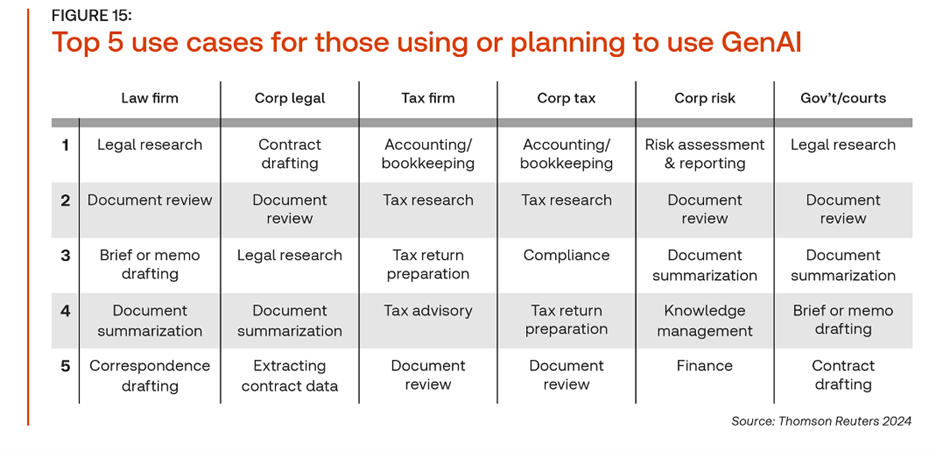

State of Play: Adoption of Gen AI in Corporate Legal Departments
- Legal Transformation
The data shows a big gap between interest in and adoption of Gen AI. While 85% of legal industry respondents believe Gen AI can be used for legal work, according to the recent Generative AI in Professional Services report from the Thomson Reuters Institute, only 25% of corporate legal department respondents have used Gen AI tools such as ChatGPT.
Riding the AI Wave
Legal teams in tech-centric companies are experiencing pressure to adopt Gen AI, whereas those in heavily regulated industries — typically also hosting sensitive customer data — are approaching its adoption much more cautiously. In both groups, many are seizing the opportunity to drive investment in established, legal-specific AI tools, even if Gen AI is not yet incorporated in the tools. As shown below, the top use cases in corporate legal departments are centered around consuming and generating legal documents (including contracts) consistently and efficiently.

Notably, the tools selected for in-house contracts drafting, review, and data analytics typically add Gen AI features; they are not born-yesterday Gen AI tools. Reflecting the growing maturity of the legal operations function, many legal departments are agnostic about how AI or Gen AI models “under the hood” work — as long as they get the intended results (improved efficiency without sacrificing quality or adding risk).
Taking a Measured Approach
Riding the Gen AI wave for corporate legal departments involves making the right moves in the right order. Here’s the typical pattern:
- Advising the business — Many focus first on developing the knowledge, policies, and engagement opportunities to ensure that Gen AI is being used responsibly across the company.
- Making the case — For many, this can be especially difficult because projected time savings are not as compelling as cost savings and because the pricing models for most Gen AI tools are not yet clear.
- Preparing and experimenting — This stage involves not only policy development but also forming task forces, identifying potential use cases, collecting exemplary documents or contracts to experiment with, and conducting pilots — with or without external solution providers.
- Proselytising — Ironically, after all that preparation, many soon shift from focusing on governance to encouraging the use of the available tools as initial curiosity and enthusiasm give way to inertia.
Developing Good Wave-Riding Form
In Epiq’s fifteen-year history of assisting corporate legal departments, never has there been such extensive experimentation with a fast-evolving set of technologies. This is a time to lean into intrapreneurial skills — helping the organisation innovate without developing change fatigue.
The following tips may be helpful to those wishing to ride the AI wave toward more efficient legal solutions.
- Choose pilot use cases carefully. Engage stakeholders in generating ideas about pain points to address with AI or Gen AI, then sift down to one or two use cases that are the best candidates for a pilot (not necessarily targeting the highest priority need). Consider the humans in the loop, the availability of ample and exemplary content to work with, short enough cycle times to see results, and the ability to compare to established practices.
- Pick a good team. Sustained attention, patience with iteration, and willingness to take a collaborative approach and provide thoughtful feedback are critical qualities. So is expertise because AI or Gen AI tools are powerful in the hands of subject matter experts — they are not substitutes for nuanced human judgment. These attributes are important in internal teams and external partners.
- Pick the right tool for each chore. Considering that in most legal departments, most of the work gets done in M365, using Copilot is a relatively accessible way to make myriad and meaningful improvements in productivity — and getting the hang of it now will prepare team members to apply it to more sophisticated use cases over time. Remember also that having several tools in the box helps. Gen AI technology options are taking a variety of shapes. Partnering with IT departments or legal solution providers can be very useful in selecting the right Large Language Models (LLMs) for specific use cases or developing hybrid tools.
- Don’t overlook workflow. In the excitement about applying AI in legal, some are selecting AI-based point solutions that lack workflow capabilities and administrative features that help ensure only the right people get access to certain information. So, building on the aforementioned advice to pick the right tool, don’t overlook established AI-driven contracting and low/no code workflow automation solutions that have useful controls to manage the work, provide security, and generate useful data and reporting.
- Apply the change management playbook. The amount of explaining and training needed must not be underestimated. Legal department leaders who successfully foster the use of Gen AI are continuously helping users understand how to define personas, prompt effectively, and iterate to get the desired results. Additionally, they are taking a tailored approach with colleagues or practice groups, providing examples and analogies, and quickly revising the composition of their task forces and the use cases being pursued as experience mounts.
By carefully selecting pilot use cases, assembling well-suited teams, choosing the right tools, and applying change management practices, legal departments can close the gap between interest in and adoption of Gen AI.

Catherine J. Moynihan is Senior Director, Strategic Intelligence & Advisory for Epiq’s Legal Business Advisory Group overseeing Hyperion Research, Epiq’s legal market intelligence program, as well as spearhead legal advisory intelligence programs for global legal executives focused on legal operations transformation.
Moynihan joined Epiq from the Association of Corporate Counsel (ACC), where she launched and led the ACC Legal Operations section, providing research, education and knowledge-sharing for improving operational effectiveness. Moynihan is distinguished for developing the ACC Legal Operations Maturity Model, toolkit, and training, as well as leading the ACC Value Champions program to identify and disseminate leading practices.
Moynihan has an MBA from Columbia University and a BA in International Relations and English from the University of Virginia. She is a member and trustee of the College of Law Practice Management, which recognizes distinguished law practice management professionals.
The contents of this article are intended to convey general information only and not to provide legal advice or opinions.